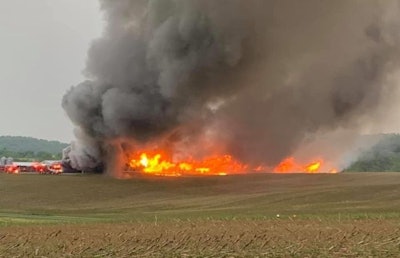
A poultry barn and 64,000 chicks in Upper Tulpehocken Township, Pennsylvania, were lost in a fire on June 5.
According to a report from Firehouse.com, the property was owned by Curtis and Lois Lehmen, who are contract growers for Bell & Evans, a family-owned poultry company also known as Farmers Pride Inc.
When firefighters arrived on the scene around 8 p.m., the barn was engulfed in flames, with more than half of the building collapsed. Strausstown Fire Company Chief Jeremy Bentz estimated that about $700,000 worth of damage was done to the 76-foot by 750-foot barn.
The 64,000 chicks at the farm had just been delivered on May 30.
The cause of the poultry barn fire has not yet been determined, Bentz told reporters.
About 12 crews from multiple fire departments responded. They remained on the scene for more than 3.5 hours. Water had to be transported onto the farm to help control the fire.
In April 2014, another fire caused losses for Bell & Evans. About 37,000 chickens being raised for the company were lost in Lititz, Pennsylvania. That fire was believed to have been started by an electrical malfunction.
Bell & Evans, according to the WATTAgNet Top Poultry Companies Database, produced 4.10 million pounds of ready-to-cook chicken on a weekly basis in 2019, an increase of 600,000 pounds — or about 17.1% — from 2018.
The company in 2019 announced it was transitioning away from using a slower-growing breed and will instead use a proprietary breed with some characteristics of the slower-growing breed it was previously using and some characteristics of conventional broiler birds. The company is also in the process building a new poultry processing plant in Pennsylvania that is expected to process 2.6 million birds per week at full capacity.


















